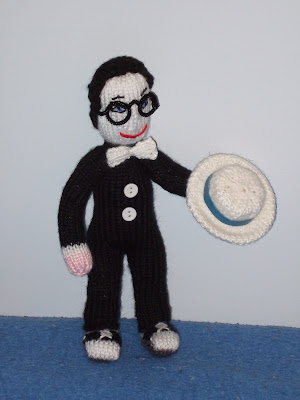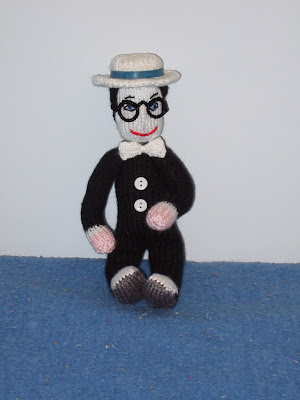Human
puppet: someone who is
easily jerked around by others. Someone who realizes her position in life is
always so, so fragile. Someone who gingerly creeps, tippy-toe, tippy-toe, along
thin ice at the top of Niagara Falls
She doesn’t
know how it got that way, but maybe she does. Right out of the egg? Wrong egg,
wrong sperm? Sometimes it seems that way. And it truly does not matter what she
had to bear to survive her childhood, to pull herself out of an inferno of
post-traumatic stress in her 30s: it has all been reburied, forgotten again,
put away. Then there was the alcohol, but we won’t get into that, will we?
About how her kids at first felt proud of her for going to AA, for finally
getting her act together and not landing in the goddamn hospital with sickening
regularity?
Going to AA
wasn’t exactly a picnic, but her kids were there at her cakes, and her daughter
even gave her a cake at some point, maybe five years. Who knows what the creep
of time brings? A restored life, maybe, spreading out in many directions, being
seen almost as normal sometimes, though of course she wasn’t. Only she knew
about how the fragments of her life were wired together, held together by main
strength and force of will.
And then, many
years later, when everything exploded and flew to pieces again, it was:
sympathy, compassion, love? No: horror, denial, and accusations that she was
making the whole thing up. Faking sickness to get attention for some bizarre
reason. When the truth was, for most of her life she had been faking health,
trying to keep up a mask that looked enough like her that most people were
fooled.
All right, all
people.
How is it that
you can be married for 40 years and have a spouse who knows absolutely nothing
about you? How is it that he can even admit, “look, I learned to tune you out a
long time ago for my own survival”? Admitting that what she said was just
noise, verbal garbage, narcissism and histrionics in a form that wasn’t even
words any more, just a sort of “bluhbluhbluhbluhbluhbluhbluhbluhbluh” that
didn’t even go in one ear and out the other, because it never went in
one ear to begin with.
So he has
learned to tune me out “for his own survival”, and he has become extremely good
at it, to the point that any time I am in pain or distress, a big soundproof
sliding door comes down with a heavy clang. But what about MY survival? Or have I already
died in this family? I try too hard, I know I try too hard with the
grandchildren and it is beginning to backfire. I see the hard-eyed looks my
children give me, the sense of “what the hell is she up to now?”. I realize the
things I love and work so hard at are so incomprehensible them that not only do
they not take any interest in them, they don’t even know what planet they are
from or why anyone would want to bother with them at all.
So I am lonely.
If I say I am lonely within this family that I co-founded so long ago, the
response will be outrage that I would ever accuse them of being so
heartless. Lonely?? What are you saying, when we allow you to come to
our houses and look after our children, when we give you every chance to make
individual gifts by hand for their birthdays (secretly sniggering about it
behind my back: “waaaaaaaay too much time on her hands!” - I’ve heard
them at it, but mustn’t say anything. Mustn’t.) How can you be “lonely” unless you’re some
kind of freak? Go out and make some friends! Do something normal for a change,
stop pretending you’re a “writer” and being so pretentious and unrealistic.
She remembers
the shrink, a thug who looked like Leonid Brezhnev, who said to her in his
thick deep thug voice, “Get a job. Get a job at 7-11 maybe and just do writing
as hobby.” If she’d had a gun in her hand his wonderful vocational counselling
would have been spurting out the other side of his fucking thug head and
splattering the psych ward walls with
brain pulp that had turned out to be a complete waste of time.
Thinking about
dying is something she has become very good at: she started at maybe age
thirteen. Though there have been many fallow periods, even years at a time when
it never crossed her mind, it was inevitable that SOMETHING would toss her
right back to the beginning again and hold her there until she suffocated. She
has come to realize that you must not just think of “a way to do it”. You must
choose at least two methods concurrently. Take pills, slash wrists (and
if you’re really thoughtful and caring, do it in the bathtub so there will be
less mess to clean up. Just turn on the tap, you’re done, no towels spoiled).
She saw that YouTube video of the guy jumping off a bridge and thought it was
magnificent, but he’d have to be full of pills, a lethal amount, first. A dear
friend of hers, incarcerated in a psychiatric ward when his psychic agony began
to overflow again, smuggled in pills, took them all, then wandered out in the
middle of a blistering winter night, passed out beside the railroad tracks like
a bum, and was found frozen stiff the next day, a Bobsicle, doublekilled. Man,
he was good! He must have practiced for a long time.
She wondered
about THREE ways, but didn’t know how to juggle it all: slish, slash, I was
takin’ a bath; jumping-jack flash, it’s a gas-gas-gas; and she couldn’t think
of anything cute and self-concealing for the pills. Suicide was hilariously
funny. She could not count the number of times she had made therapists smirk,
smile or even bark with laughter. They thought she was funny.
Badda-boom! She had trained herself that way all her life, learned in her
cradle to be amusing, to be the mascot, to keep her father from murdering her
in her bed. She had learned to be witty while her older siblings got her drunk
at parties and snickered when they found out their married friends (with their
wives in the next room) had groped her in the bathroom.
But it’s all
in fun, isn’t it? Fun, fun. I was lucky to have those social occasions. So they
said to me. I should’ve been grateful. And though for years and years
she thought she had escaped those poisonous dynamics, she hadn’t. Once again
she was a sharecropper in her own home. All she had was some sort of fragile
tenancy that could fall through at any moment. “Oh, massa
How could
anyone want to keep going, to feel any relish for life, when after years
and years of struggling to do reasonably well everything blew apart again and
hurled you back four decades into helplessness? How could anyone be
“entertaining” when their life was unravelling like a sweater, when they were
trying frantically to grab on to a
greasy pole, when some hideous beanstalk or poison tree had suddenly thrust up
out of nowhere to blow all order and sanity apart?
The most
important part of the suicide thing, and the place where nearly everyone falls
down, is not letting anyone find you. DON’T do a Marilyn Monroe and get on the
phone. DON’T call 9-1-1 because 9-1-1 doesn’t rescue useless pieces of shit
that want to die anyway. Sylvia Plath set it up so that someone would find her,
but oopsy, doopsy, this was a person who wasn’t very punctual, and on that
particular day she was tardy enough to cause Sylvia Plath’s death at 30. Or at
least, to not prevent it. Everyone dies anyway. Lots of people die
catastrophically every day, accidents, poison, murder. Some die in the womb. We
all get erased, then the timer is reset to before we even came on the scene.
Click! Isn’t this just speeding it up a little?
But she doesn’t,
not on that particular day anyway, because even though she ceased to believe in
a benevolent God a long time ago, she has still not completely dispensed with
the fear that there is a hell, that she won’t escape herself at all, that she
will be pinned, doomed to drink her own poison for all eternity. Or perhaps watch
her family howl and scream with rage: “How could she do this to me?”









.jpg)
.jpg)
.jpg)
.jpg)

.jpg)












.jpg)
.jpg)




























